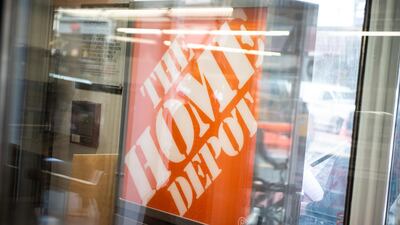Home Depot may not have impressed investors with its first-quarter earnings results last week, but I still think it's clear this company is a rare retailer that's not in need of much renovation.
The hardware and household-improvement chain on Tuesday said comparable sales grew 4.2 per cent in the latest quarter compared with a year earlier, even as the late arrival of warm weather across much of the country meant many shoppers weren’t yet shelling out for seasonal merchandise. The company reaffirmed its full-year guidance, suggesting it still expects to capture that spending as temperatures rise.
Investors sent shares down more than 2 per cent in early trading because quarterly revenue fell short of analysts’ more bullish forecasts. But make no mistake: it is truly remarkable how unremarkable it has become for Home Depot to deliver that kind of comparable sales growth.
The retail world is beset by a long list of thorny problems, including figuring out how to survive as mall traffic dries up and how to market to millennials. This tide of transformation has left plenty of devastation in its wake, including bankruptcies, store closures and canned executives. And yet, Home Depot just keeps chugging along. The chain has now delivered year-over-year comparable sales growth for 28 straight quarters. Much of the time, that growth hasn't been merely modest; it has been robust. Only twice during the streak has it recorded quarterly comparable sales growth that was lower than 4 per cent.
Of course, Home Depot's long run of success, especially in its US homeland, is in part a reflection of a largely healthy housing market. To the extent the sales slowdown reflects a cooling there, that could be a concern, but revenue growth was still quite healthy.
_______________
Read more:
Home Depot tops earnings estimates
Amazon gets physical in bid to maintain momentum
_______________
Working in Home Depot’s favour is the fact that the home-improvement category hasn’t been walloped by the rise of Amazon.com in the same way that, say, the electronics or apparel business has. But the chain is doing much more than just coasting on a favourable business environment. It has thrived because it has been prudent and patient about how it pursues growth.
It wisely has made it a top priority to court what it calls "pro" customers, such as contractors. A senior executive has said pros only comprise about 3 per cent of Home Depot's traffic, but they account for about 40 per cent of sales. Home Depot has made a serious effort to improve the shopping experience for these loyal customers, notes Seema Shah, a retail analyst with Bloomberg Intelligence, by adding brands that appeal to them and making it easier to pick up online orders quickly at stores. It seems to have worked, with sales tending to grow stronger in Home Depot's pro segment than its do-it-yourself category.
With 90 per cent of Americans already living within 10 miles of a Home Depot store, the company has understood its US sales growth must largely come from online and the stores it already has. So instead of opening a bunch of new outposts, the company is going for growth by, for example, making its current locations easier to navigate and beefing up its online assortment in categories such as decor.
Home Depot has said it aims to boost its annual revenue to between $115 billion and $120bn by fiscal year 2020, and I see little reason it can't achieve that. It has sound strategies for growth, and upbeat consumer sentiment should continue to be a helpful backdrop.
If there is anything that could create fresh pressure for Home Depot, it's the possibility that its chief rival, Lowe's, soon could become a more formidable challenger in the US. Lowe's said in March that its CEO, Robert Niblock, plans to retire after 13 years in the top job as soon as the board is able to identify and appoint a successor. While Lowe's also has held up quite well during hard times for the retail business, it hasn’t been quite as much of an industry rock star as Home Depot. There’s a chance a new leader could find fresh ways for Lowe’s to challenge Home Depot’s market share.
But, for now, there's little to suggest that Home Depot will be be anything other than a retail powerhouse in the near future.
Bloomberg

